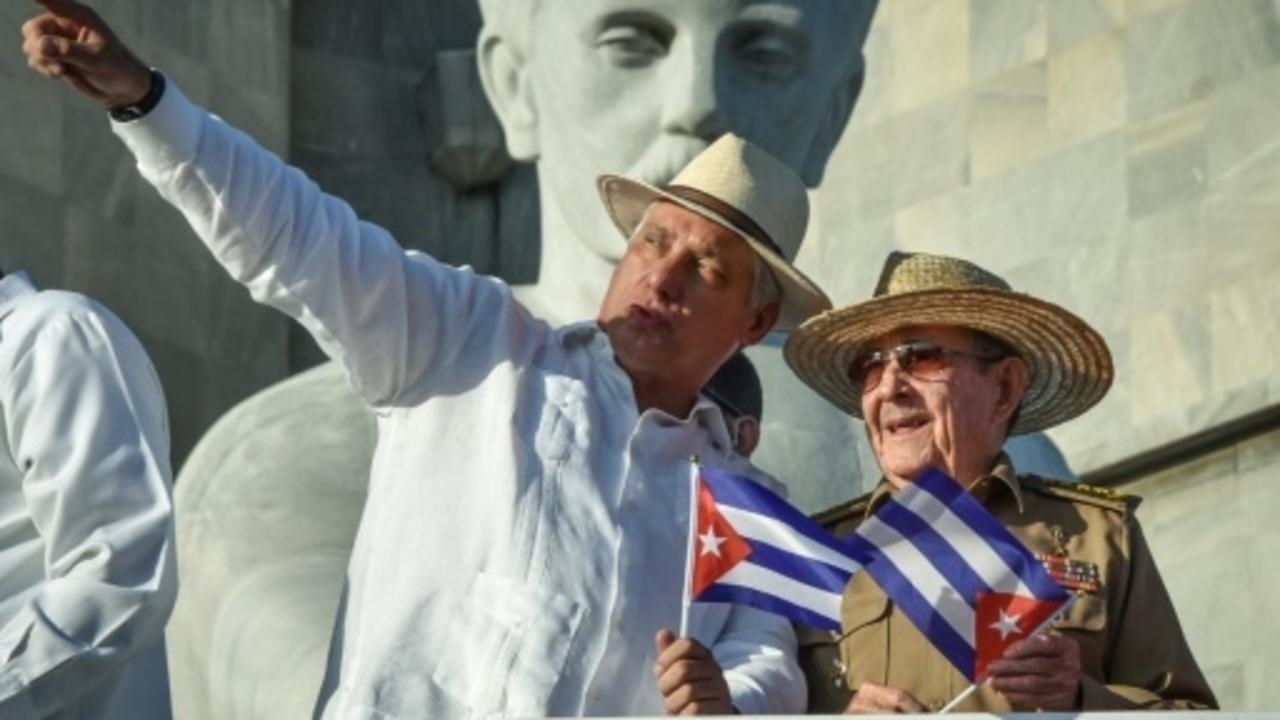
Raul Castro has announced that he is stepping down and making room for his hand-picked BFF, who some say is much more. To me, it is difficult to imagine Fidel’s younger brother stop bending over and letting someone else take over so he can be doing what he likes. Cuba si, Comunimso no!
Castro has been preparing to step down as head of Cuba's all-powerful Communist Party, ending decades of his family's leadership in the country. Cubans expect to witness this historic changing of the guard at the 8th Congress for the Cuban Communist Party, which begins now.
Cuban President Diaz-Canel made Communist Party leader, ending Castro dictatorship. Decades after Fidel Castro and his brother Raul took power, Cuba is now poised for public life without a member of the Castro clan. The 89-year-old Raul, a fellow leader of the 1959 revolution who first took over Cuba's presidency from his ailing older brother in 2006, will attend his final Communist Party congress as secretary-general this weekend. At the close of the four-day event, Castro will hand over the reins to its freshly elected chief, and his protégé Diaz-Canel Raul’s favorite flavor, who has taken over in more ways than one.
Raul chose Miguel Diaz-Canel but had remained the party's first Secretary until today. This is a key diplomatic juncture for the US. Relations because so far, President Biden has been reluctant to engage with Cuba, but there are others who feel this is a good time to push forward with new relations.
While Raul claims to be stepping down as the head of the Communist Party of Cuba, the most powerful position on the island, with few expectations of significant change among Cubans, despite it being a historic move, we have to wait and see. https://nbcnews.to/3wSMpz8
I have a unique point of view because I am not only a Cuban-born political refugee, but I was recruited by President Bush to run TV Marti Noticias, a USA-funded broadcasting service produced for the millions of Cubans still left on the island.
We had been traveling out of Cuba with my parents and brothers, focusing on baseball. Despite the little statistical promise, it was St. Louis Cardinals and Cleveland Indians who our family followed especially close as Beisbol got under my father’s skin. In fact, he named me after his favorite Cleveland pitcher, Bob Feller. One baseball season we visited The United States of America to watch them play, but my family fled the Communist island for our final time. But I digress.
The heir-apparent to Lead Cuban should have been Fidel Castro Jr. Although his parents divorced in 1955, prior to the Cuban Revolution in which his father seized power in the country. His mother moved to Miami, United States, taking her son with her. Fidelito, as he was known returned to Cuba as a child to visit his father, and remained there for the rest of his childhood.
Cuba said little about the succession of power, but took yet another opportunity to attack America by writing “when some might think that, exhausted by brutal U.S. attacks, #Cuba would lose strength, here is our vanguard fighting with bare fists to make this extraordinary island a more prosperous, contented country.’
Fidelito Castro Díaz-Balart, yes related to US. Congressman Mario Díaz-Balart, currently representing the 25th district of Florida, and NBC News anchor Jose were his cousins. Fidel Jr. moved to Moscow, where he became a nuclear scientist. Returning to Cuba, he was placed in charge of Cuba's nuclear power program for a time, leading the Juragua Nuclear Power Plant construction program from 1980 to 1992, during which time he was also the executive secretary of the country's Atomic Energy Commission. Castro Díaz-Balart was removed from his positions in June 1992, following a falling out with his father, who cited "inefficiency" as the reason for the removal. Castro then announced the suspension of construction of a nuclear power plant in 1992, due to Cuba's inability to meet the financial terms set by Russia to complete the reactors.
Castro Díaz-Balart then returned to further his studies in Moscow and received his second doctorate in 1999. In the 2010s, he returned to a level of prominence, serving as a scientific advisor to the Council of State, the governing body of Cuba, and as vice-president of the Academy of Sciences of Cuba. Throughout his career, Castro Diaz-Balart authored articles on the developing role of nuclear energy.
In April 2014, he visited Russia to declare Cuba's recognition of the annexation of Crimea by the Russian Federation, In February 2015, during the Cuban thaw towards the end of the Obama Administration, when Americans were more freely allowed to visit Cuba, he participated in events to welcome American celebrities to the island, mingling with Paris Hilton and Naomi Campbell. The following month, he visited Novosibirsk, Russia, meeting with the mayor, Anatoly Lokot, and regional governor Vladimir Gorodetsky to improve Cuban relations with scientific institutions in the region.
Castro Díaz-Balart mysteriously committed suicide in Havana on 1 February 2018, at the age of 68. He had reportedly received outpatient care for depression. The report of his suicide by the Cuban government was described as "unusually public." At the time of his untimely death, he held his positions with the Cuban Academy of Sciences and the Council of State.

